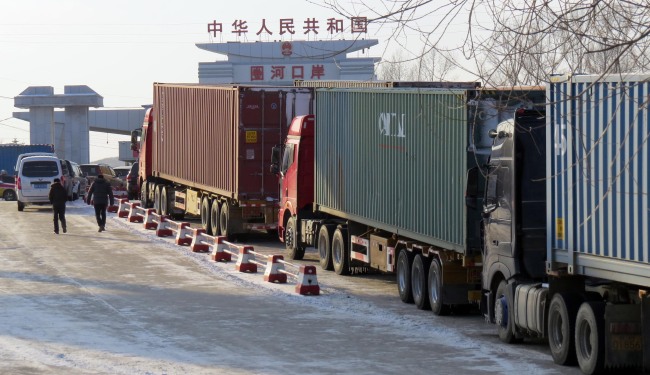North Korea’s trade dependency on China reached an all-time high last year, while its luxury goods imports amounted to nearly $666 million, according to a lawmaker.
The figures come amid the international community’s growing efforts to place a cap on the reclusive nation’s economic activity by convincing Beijing to use its clout against Pyongyang.
 |
A line of Chinese shipping container trucks are waiting to enter North Korea. (Yonhap) |
A recent report by the Korea-Trade Investment Promotion Agency said the North’s trade dependency rate on China inched to 92.5 percent in 2016, a tad higher than 91.3 percent in 2015. Its rate with Russia, which came in second, stood at 1.2 percent, making China clearly North Korea’s economic lifeline.
The total trade volume between the two nations in 2016 added up to almost $6 billion, which was a 6.1 percent increase compared to 2015, said KOTRA.
North Korea’s imports of luxury goods last year jumped 9.8 percent to $666 million, amounting to 17.9 percent of its annual imports, Chinese Customs data cited by Rep. Yoon Sang-hyun of the Liberty Korea Party here showed. Such products included upmarket electronics, cars, leather products and watches.
Previously, reports of the North’s increasing demand for foreign goods such as chocolate and alcohol from China, had made headlines after Hong Kong’s South China Morning Post said it imported about 167.9 tons of chocolate worth $398,000 from China during the first quarter of the year. The figure nearly doubled on-year.
Experts cited the birth and rise of a new middle class in North Korea as the reason for the increasing demand for foreign goods there.
“Kim Jong-un’s move to bring some elements of capitalism including a market economy into its socialist economic system has seemingly invigorated North Korea’s economy, because it has awoken its people to a new way of life,” Yang Un-chul, vice president of the private Sejong Institute, previously told The Korea Herald.
China implemented the latest United Nations sanctions on the rogue regime following its series of nuclear and missile tests in September.
Last month, Beijing ordered the shutdown of North Korean-owned businesses in China by early January, following its announcement it would cut off gas and limit shipments of refined petroleum products. But crude oil, which accounts for the biggest share of its energy exports to the North, has not been subject to the ban.
Regarding the sanctions, experts say it may take more time for the effect to kick in.
Seoul’s Unification Ministry said Monday that the northern neighbor may undergo severe economic hardships in the near future, when the latest United Nations Security Council and the US’ unilateral sanctions take effect.
About 90 percent of North Korean export products are expected to struggle under the sanctions, said Unification Minister Cho Myoung-gyon.
“After the death of founder Kim Il-sung, North Korea faced severe economic difficulties. In some cases, we think that the North‘s situation could get worse compared to that period,” Cho Myoung-gyon said at a forum, referring to the period in the 1990s when North Korea was struck by widespread famine.
By Jung Min-kyung (
mkjung@heraldcorp.com)








